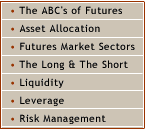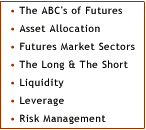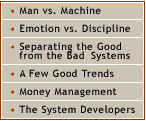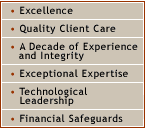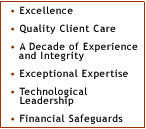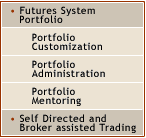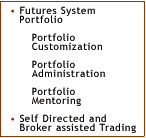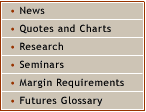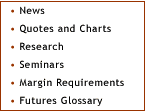


Emotion vs. Discipline
It's Human Nature
No matter how intelligent and rational futures investors may be, when they
trade they tend to become emotional. The voice of emotion is all too familiar.
"I really feel gold is going up." "I believe the war will send
oil through the roof." "I was so sure the market had bottomed, I
jumped in-big." "I am losing, but I'll wait until the contract bounces
back." "I could kick myself, I took profits too early." "I
could kick myself, I stayed in too long and lost my profits."
Most "human" traders,
whether they are amateurs or professionals, run the risk of rising emotions.
For some investors its ego, greed or wishful thinking that undermines effectiveness.
For others its denial, fear or panic that shakes confidence. When it comes to investing
in complex futures markets, human emotion can cause investors to be inconsistent and undisciplined.
The commonly held belief that 9 out of 10 futures traders lose money can be partially
explained as a consequence of human emotion. After all it's human nature.
System Discipline
Futures Trading Systems are the "machine" antidote to human emotionality.
A computer-based trading system generates instructions based solely on programmed
rules. These system rules determine timing for market entry and exit, profit
targets, and protective stops to limit losses. A system's binary code is emotionless.
The system does not believe, feel, worry or obsess over a trade. It simply transacts
unemotionally. System execution is objective, disciplined, quantitative and
scientific.
During the past decade the principals of Trade Center, Inc. have had the opportunity
to work with and observe the trading habits and strategies of many clients. Based on
our experience with investors, we have identified some of the characteristics we believe
differentiate their methods of trade. While not true of all investors, the following
illustrates some of the differences we have noticed between an investor who uses a
trading system and an investor who does not.
The Non-System Investor
Immediate gratification
Changes mind mid-stream
Undercapitalizes trades
Over commits to single market
Unable to monitor all opportunities
Tries to predict/outsmart the markets
|
|
 |
|
The System Investor
Follows system's long-term strategy
Disciplined implementation
Account size predetermined to fit system
Diversified into multiple markets
Constant observation global markets
Assumes favorable ratio of gains over losses |
This is not to say that all futures trading systems are equal nor to imply that
there are no risks associated with a futures trading system. Learn
more about how to separate the good from the bad Futures Trading Systems…>>

|











